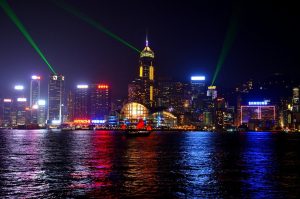The United States will suspend the export of controlled defense equipment to Hong Kong, citing China’s passage of a new national security law. In a statement on Monday, U.S. Secretary of State Mike Pompeo said that the “United States will today end exports of U.S.-origin defense equipment and will take steps toward imposing the same restrictions on U.S. defense and dual-use technologies to Hong Kong as it does for China.”
“The Chinese Communist Party’s decision to eviscerate Hong Kong’s freedoms has forced the Trump Administration to re-evaluate its policies toward the territory,” Pompeo said, saying that the decision was necessary to protect U.S. national security.
According to the U.S. secretary of state’s statement, the United States “can no longer distinguish between the export of controlled items to Hong Kong or to mainland China.” “We cannot risk these items falling into the hands of the People’s Liberation Army, whose primary purpose is to uphold the dictatorship of the CCP by any means necessary,” Pompeo added.
The action is the latest in a series of planned steps by the United States government to protest China’s move, codified in a May meeting of the National People’s Congress, to move ahead with a national security law for Hong Kong. The law is expected may be passed during this week’s meeting of the National People’s Congress Standing Committee; the law’s full text has not been published.
Last week, the U.S. State Department announced that Chinese Communist Party officials deemed to have a role in infringing Hong Kong’s autonomy would be barred from receiving U.S. visas. The ban would also apply to the family members of officials in some cases. Amid the pandemic and the reduction in global travel generally, this step was largely symbolic.
The change in Hong Kong’s eligibility for controlled defense exports, however, is a more serious substantive change to the nature of the United States’ special relationship with the Chinese territory.
Other steps the Trump administration may choose to take toward Hong Kong include a suspension of its eligibility for preferential tariff rates for exports to the United States—a step that would have a serious effect on the city’s continued status as a major global trade and financial hub.
In late-May, U.S. President Donald J. Trump announced that he had directed his administration “to begin the process of eliminating policy exemptions that give Hong Kong different and special treatment.”
“My announcement today will affect the full range of agreements that we have with Hong Kong, from our extradition treaty, to our export controls and technologies,” Trump said. “We will take action to revoke Hong Kong’s preferential treatment as a separate customs and travel territory from the rest of China.”

































